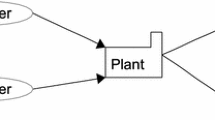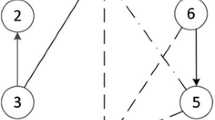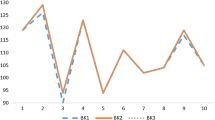Abstract
This paper considers a joint order acceptance and scheduling problem under a general scenario. A manufacturer receives multiple orders with a given revenue, processing time, release date, due date, deadline, and earliness and tardiness penalties. The manufacturer can be seen as a single-machine system. Due to limited capacity, the manufacturer cannot process every order and needs to determine the optimal set of accepted orders and corresponding production schedule such that the total profit is maximized. The manufacturer can extend its capacity with overtime by paying an additional cost. A time-indexed formulation is presented to model the problem. Two exact algorithms are proposed. The first algorithm, denoted by DPIA-GR, is a dynamic programming (DP)-based algorithm that starts by solving a relaxed version of the original model and successively recovers the relaxed constraint until an optimal solution to the original problem is achieved. The second algorithm, denoted by DPIA-LRGR, improves DPIA-GR by incorporating Lagrangian relaxation (LR). The subgradient method is employed to find the optimal Lagrangian multipliers. The relaxed model in DPIA-GR and the LR model in DPIA-LRGR can be represented using a weighted di-graph. Both algorithms are equivalent to finding the longest path in the graph and applying a graph reduction strategy to prevent unnecessary computational time and memory usage. A genetic algorithm (GA) is also proposed to solve large-scale versions of the problem. Numerical experiments show that both DPIA-GR and DPIA-LRGR solve the problem efficiently and outperform CPLEX and GA, but DPIA-LRGR offers better performance.




Similar content being viewed by others
References
Akkan, C. (1996). Overtime scheduling: An application in finite-capacity real-time scheduling. Journal of the Operational Research Society, 47(9), 1137–1149.
Baker, K. R., & Scudder, G. D. (1990). Sequencing with earliness and tardiness penalties: A review. Operations Research, 38(1), 22–36.
Cesaret, B., Oğuz, C., & Salman, F. S. (2012). A tabu search algorithm for order acceptance and scheduling. Computers & Operations Research, 39(6), 1197–1205.
Charnsirisakskul, K., Griffin, P. M., & Keskinocak, P. (2004). Order selection and scheduling with leadtime flexibility. IIE Transactions, 36(7), 697–707.
Chen, Y.-W., Lu, Y.-Z., & Yang, G.-K. (2008). Hybrid evolutionary algorithm with marriage of genetic algorithm and extremal optimization for production scheduling. The International Journal of Advanced Manufacturing Technology, 36(9–10), 959–968.
Goldberg, D. E., & Lingle, R. (1985). Alleles, loci, and the traveling salesman problem. In J. J. Grefenstette (Ed.) Proceedings of the 1st international conference on genetic algorithms and their applications, July 24–26, 1985, Pittsburgh, PA (pp. 154–159). Hillsdale, NJ: Lawrence Erlbaum.
Grosso, A., Della Croce, F., & Tadei, R. (2004). An enhanced dynasearch neighborhood for the single-machine total weighted tardiness scheduling problem. Operations Research Letters, 32(1), 68–72.
Hans, A. (1994). Towards a better understanding of order acceptance. International Journal of Production Economics, 37(1), 139–152.
Ibaraki, T. (1987). Enumerative approaches to combinatorial optimization. Annals of Operations Research (Vols. 11 & 12). Basel: J.C. Baltzer AG.
Lin, S., & Ying, K. (2013). Increasing the total net revenue for single machine order acceptance and scheduling problems using an artificial bee colony algorithm. Journal of the Operational Research Society, 64(2), 293–311.
Melchiors, P., Leus, R., Creemers, S., & Kolisch, R. (2018). Dynamic order acceptance and capacity planning in a stochastic multi-project environment with a bottleneck resource. International Journal of Production Research, 56(1–2), 459–475.
Mestry, S., Damodaran, P., & Chen, C.-S. (2011). A branch and price solution approach for order acceptance and capacity planning in make-to-order operations. European Journal of Operational Research, 211(3), 480–495.
Nguyen, S., Zhang, M., & Johnston, M. (2014). Enhancing branch-and-bound algorithms for order acceptance and scheduling with genetic programming. In M. Nocolau, et al. (Eds.), Genetic programming. EuroGP 2014. Lecture Notes in Computer Science (Vol. 8599, pp. 124–136). Berlin: Springer.
Nobibon, F. T., & Leus, R. (2011). Exact algorithms for a generalization of the order acceptance and scheduling problem in a single-machine environment. Computers & Operations Research, 38(1), 367–378.
Og, C., Salman, F. S., & Yalçın, Z. B. (2010). Order acceptance and scheduling decisions in make-to-order systems. International Journal of Production Economics, 125(1), 200–211.
Rom, W. O., & Slotnick, S. A. (2009). Order acceptance using genetic algorithms. Computers & Operations Research, 36(6), 1758–1767.
Slotnick, S. A. (2011). Order acceptance and scheduling: A taxonomy and review. European Journal of Operational Research, 212(1), 1–11.
Slotnick, S. A., & Morton, T. E. (2007). Order acceptance with weighted tardiness. Computers & Operations Research, 34(10), 3029–3042.
Sourd, F. (2006). Dynasearch for the earliness–tardiness scheduling problem with release dates and setup constraints. Operations Research Letters, 34(5), 591–598.
Tanaka, S., Fujikuma, S., & Araki, M. (2009). An exact algorithm for single-machine scheduling without machine idle time. Journal of Scheduling, 12(6), 575–593.
Thevenin, S., Zufferey, N., & Widmer, M. (2015). Metaheuristics for a scheduling problem with rejection and tardiness penalties. Journal of Scheduling, 18(1), 89–105.
Ventura, J. A., & Yoon, S.-H. (2013). A new genetic algorithm for lot-streaming flow shop scheduling with limited capacity buffers. Journal of Intelligent Manufacturing, 24(6), 1185–1196.
Xiao, Y.-Y., et al. (2012). Permutation flow shop scheduling with order acceptance and weighted tardiness. Applied Mathematics and Computation, 218(15), 7911–7926.
Yoon, S.-H., & Ventura, J. A. (2002). An application of genetic algorithms to lot-streaming flow-shop scheduling. IIE Transactions, 34(9), 779–787.
Zhong, X., Ou, J., & Wang, G. (2014). Order acceptance and scheduling with machine availability constraints. European Journal of Operational Research, 232(3), 435–441.
Acknowledgements
The authors are grateful to the associate editor and two anonymous reviewers for their helpful comments on an earlier draft of this paper.
Author information
Authors and Affiliations
Corresponding author
Additional information
Publisher's Note
Springer Nature remains neutral with regard to jurisdictional claims in published maps and institutional affiliations.
Rights and permissions
About this article
Cite this article
Li, X., Ventura, J.A. & Bunn, K.A. A joint order acceptance and scheduling problem with earliness and tardiness penalties considering overtime. J Sched 24, 49–68 (2021). https://doi.org/10.1007/s10951-020-00672-5
Accepted:
Published:
Issue Date:
DOI: https://doi.org/10.1007/s10951-020-00672-5




